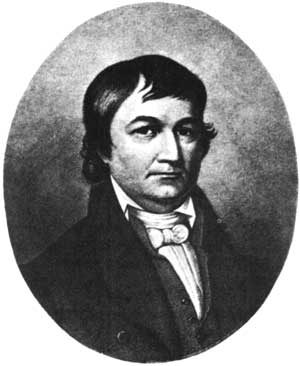|
CHALMETTE National Historical Park |
 |

Brig. Gen. John Coffee, 1772—1834, who
commanded the Tennessee troops in the Battle of New Orleans, and played
the most important part in the American night attack on the British on
December 23, 1814.
The Pensacola Affair
Meanwhile Jackson, busy with Creek Indians in the summer of 1814, began to hear of British activity on the Florida coast. The same Britishers who in September, would offer Lafitte money and a captaincy to join them were now landing soldiers and furnishing supplies to Indians hostile to the United States. Disturbed by these developments, Jackson dictated a treaty to the Creeks and marched to the Gulf Coast in August 1814.
At Mobile he learned that the British under Col. Edward Nicholls had taken Pensacola from the Spaniards, at that time the nominal rulers of Florida. Nicholls issued a proclamation calling on those whom he supposed to be dissatisfied with American rule—Creoles, Kentuckians, and others to support the British. Jackson replied with his proclamation urging the inhabitants of Louisiana to resist the invaders.
Although he commanded 5 regiments and 350 artillerymen in Military District No. 7, Jackson's forces were scattered. He appealed to Secretary of War James Monroe for more men and materials, but the successful British attack on Washington tied Monroe's hands.
Adding to Jackson's problems were repeated letters from Governor Claiborne requesting more regular troops and a personal visit by the general to New Orleans to boost lagging morale.
The general felt, however, that affairs near at hand needed attention first. He believed that the enemy wanted to seize Mobile, and thence go to New Orleans by land. Jackson strengthened Fort Bowyer, at the entrance to Mobile Bay. Fort Bowyer beat off a British attack, but the American commander continued to build up the defenses of Mobile.
His forces there were much strengthened by the arrival of Brig. Gen. John Coffee's Brigade of Tennessee mounted infantry. In response to a letter from Jackson to the Governor of Tennessee, these volunteers had gathered at Fayetteville in that State. From there, they rode through Chickasaw and Choctaw lands and reached Mobile on October 25.
Now Jackson could take the offensive and give some attention to New Orleans. A quick march to Pensacola in November and a surprise attack drove our the British. Sending an expedition to keep the Seminoles in check, and leaving another part of his force at Mobile, Jackson at last departed for New Orleans.

|
|
Last Modified: Mon, Dec 2 2002 10:00:00 am PDT |


